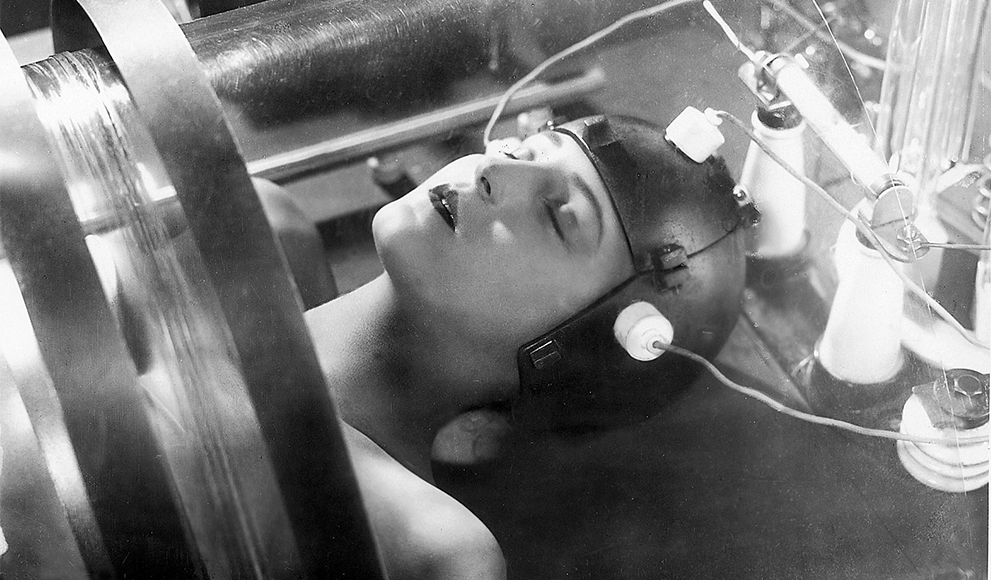Frankenstein and Author Mary Shelley are the Inspiration for This Season’s Cinéphile Sundays Series, "Exquisite Combinations"

During an atypically cold, wet summer on Lake Geneva in 1816, a group of young poets and writers devised ways to pass the time indoors. One of their diversions was a contest to conceive the most horrific story imaginable. Mary Wollstonecraft Godwin (who would become Mary Shelley within the year) met the challenge against rivals that included Lord Byron and her future husband, Percy Shelley, by creating Dr. Frankenstein and his monster.
Shelley's winning entry became the novel Frankenstein, or, The Modern Prometheus, in 1817, and her horror classic has been in print ever since. Shelley and her tale of man manipulating humanity are the inspiration for the theme of this season’s Cinéphile Sundays series, "Exquisite Combinations."
In the preface to Frankenstein, Shelley wrote "… so many combinations of feeling have resulted in the highest specimens of poetry." Maurizio Viano, co-director of the Department of Cinema and Media Studies, said, "replace 'poetry' with 'cinema' and you have this Cinéphile Sundays' oblique theme." In addition to echoing Shelley’s own words, the series title is a nod to the game Exquisite Corpse, in which various written or drawn elements from players who are privy to only a portion of the other players' work come together to form a new composite reality.
Metropolis (Fritz Lang, 1927) is a highlight of the film series. A newly restored version of the Weimar Republic-era silent masterpiece will be presented February 28 in Jewett Auditorium at 3:00pm, with a live musical soundtrack by the Alloy Orchestra. Roger Ebert called the three-man ensemble "the best in the world at accompanying silent films." They will perform an original score that earned a standing ovation at Grauman’s Chinese Theatre when it premiered at the TCM Classic Film Festival in 2010.
An integral character in Metropolis, the artificial woman Maria, was the model for the bride in the classic 1935 horror film The Bride of Frankenstein, which opened the Exquisite Combinations series on Valentine's Day. Director James Whale also borrowed ideas for the design of the lab from Metropolis—and props from Whale’s film subsequently made their way into Mel Brooks' Young Frankenstein.
Three additional films are also scheduled for Exquisite Combinations. All screenings are free and open to the public and take place at 5:00pm in Collins Cinema on the dates indicated. The series is generously supported by the Wilson Fund.
Paprika, March 13
Japanese anime master Satoshi Kon tells the story of a research psychologist who invents the DC Mini, a device that allows therapists to enter the minds of their patients through their dreams. The film examines the relationship between our “selves” and machines by asking “what human morality and imagination have to do with each other” (The Guardian). The 2006 film inspired the 2010 live-action blockbuster Inception.
El espíritu de la colmena, April 10
Eight-year-old Ana sees the movie Frankenstein in a mobile theater that passes through her small Castilian village, becomes obsessed with understanding why the monster would hurt the young child he befriends, and sets out to find him. The film explores not only the mind of a child, but also the post-Spanish Civil War time period in which it is set.
Conceiving Ada, May 1
The series concludes with the tale of computer scientist Emmy Coer, who tries to communicate with the deceased Ada Byron King, Countess of Lovelace. Lovelace, the daughter of Lord Byron, created the first computer algorithm and is considered the founder of scientific computing. Metroactive.com’s review of the film observes that "[Lovelace] becomes a symbol both for fierce female genius and for the special relationship that [director Lynn Hershman] Leeson sees between women and machines."
